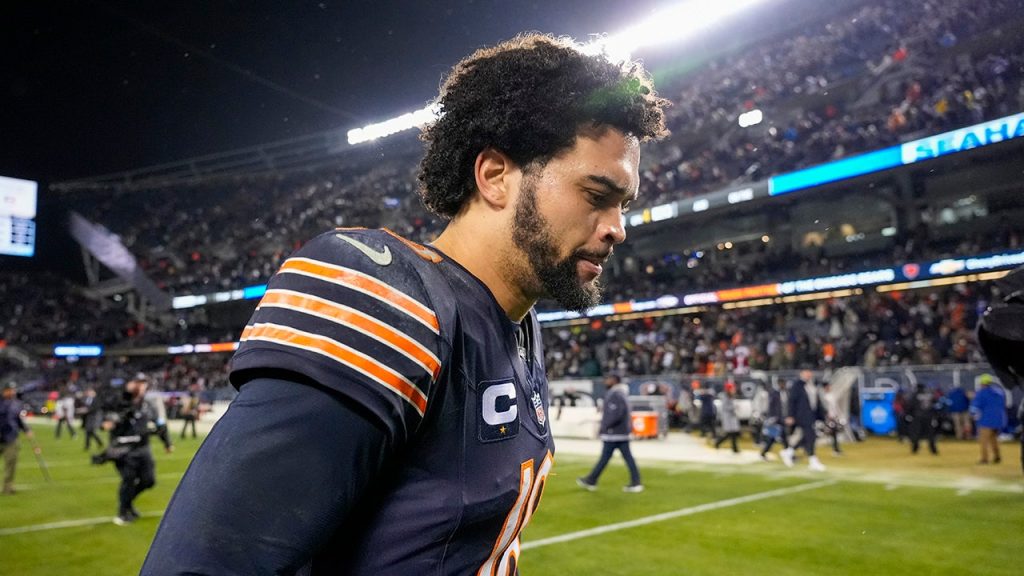The Caleb Williams Prank: A Deep Dive into a Rookie Quarterback’s Viral Moment
The world of professional sports, particularly the NFL, is a pressure cooker. Every move a player makes, every word they utter, is scrutinized under a microscope. In this environment, maintaining a sense of normalcy, especially as a rookie, can be a Herculean task. Caleb Williams, the young Chicago Bears quarterback, recently found himself at the center of a viral prank that offered a glimpse into the challenges of navigating the public eye while simultaneously dealing with the intense pressures of professional football. What began as a seemingly harmless prank orchestrated by a group of kids quickly escalated into a moment of intense frustration for Williams, revealing the vulnerability and human side of a rising star in the NFL.
The incident unfolded when Williams received a text message he believed to be from Detroit Lions offensive coordinator Ben Johnson. The message purportedly offered Williams the head coaching position for the Chicago Bears, a proposition that any aspiring quarterback would find both shocking and enticing. The veracity of the message was further reinforced by the professional tone and format, mimicking the official communications Williams had received from coaches in the past. This detail played a crucial role in convincing Williams of the message’s authenticity, leading him to believe that a monumental career opportunity was within his grasp.
Fueled by this belief, Williams readily accepted a subsequent FaceTime call, anticipating a conversation with Johnson. However, the call quickly revealed the true nature of the situation: a cleverly executed prank by a group of young fans. While Williams appeared to take the revelation in stride during the call, his internal reaction was far more turbulent. In a later podcast appearance, he candidly confessed to being "fuming" and harboring an intense desire to "smash some s—" after the call ended. This raw, emotional response humanized Williams, stripping away the veneer of the unflappable professional athlete and revealing the young man beneath.
The incident underscores the pervasive nature of digital connectivity and the ease with which even high-profile individuals can be targeted by pranks and misinformation. Williams’ long-held phone number, which he’d had for 15 years, became the unwitting gateway for the pranksters. The fact that such a seemingly private piece of information could be accessed and exploited highlights the vulnerability individuals face in the digital age, regardless of their status or profession. The incident served as a stark reminder of the importance of vigilance and the need to constantly adapt to the ever-evolving landscape of digital security.
Despite his initial anger, Williams eventually displayed a degree of magnanimity, acknowledging the ingenuity of the prank and even praising its execution. He categorized it as a "Grade A, S-tier prank," a testament to his ability to step back and appreciate the humor in the situation, even after experiencing a wave of intense frustration. This shift in perspective speaks to Williams’ maturity and resilience, essential qualities for navigating the often turbulent waters of professional sports. It highlights his capacity to learn from challenging experiences and maintain a sense of humor even in the face of adversity.
The Caleb Williams prank serves as a multifaceted vignette, offering insights into the pressures faced by young athletes in the spotlight, the challenges of maintaining privacy in the digital age, and the human capacity for both vulnerability and resilience. It reminds us that even those who seemingly live charmed lives are susceptible to the same frustrations and anxieties that we all experience. Ultimately, the incident humanizes a rising star, reminding us that behind the public persona lies an individual navigating the complexities of life, just like the rest of us. It also highlights the importance of empathy and understanding in a world increasingly dominated by digital interactions and the potential for miscommunication and misunderstanding. While Williams’ initial reaction was one of anger, his ultimate response was one of begrudging respect for the pranksters’ ingenuity, showcasing his ability to move past the initial frustration and appreciate the humor in the situation.

